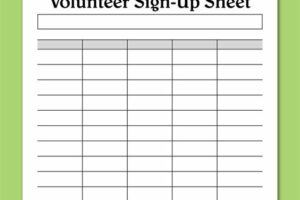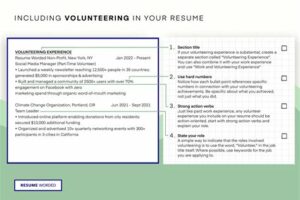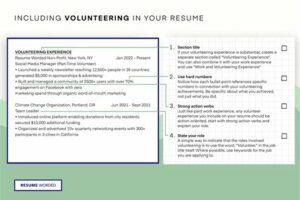Table of Contents
Wondering if you can include your volunteer work as professional experience in your resume? Discover the benefits of adding volunteering experience to showcase your skills, dedication, and community involvement. Understand how volunteering can enhance your job prospects and make a positive impact on potential employers. Find out how to effectively present your volunteer work as valuable experience to highlight your qualifications and stand out from the competition.
Volunteering is often an overlooked aspect of work experience, but it can provide invaluable skills and insights that are highly transferable to a professional setting. In fact, incorporating volunteering experience as part of your work history can be a powerful way to showcase your dedication, adaptability, and commitment to making a positive impact. Whether you have volunteered at a local charity, non-profit organization, or community event, the experiences gained are sure to captivate potential employers and give you an edge in today’s competitive job market.
Introduction
When it comes to building a strong resume, work experience holds immense value. Employers often look for candidates who have practical experience in the field they are hiring for. But what if you haven’t had the opportunity to gain paid work experience yet? Can you still include volunteering experiences on your resume in the work experience section? In this article, we will explore whether or not you can put volunteering as work experience and discuss the benefits it can bring to your professional profile.
Understanding Work Experience vs. Volunteering
Before delving into the topic, it is essential to differentiate between work experience and volunteering. Work experience typically refers to paid employment, where an individual performs tasks or duties in exchange for financial compensation. On the other hand, volunteering involves offering one’s services willingly and without expecting any monetary reward. While both types of experiences contribute to personal growth and skill development, they are perceived differently by employers.
The Value of Volunteering
Although volunteering may not provide financial compensation, it offers numerous benefits that make it worthy of inclusion in the work experience section of your resume. Volunteering allows you to develop valuable skills, gain practical experience, expand your network, and demonstrate your commitment to social causes. It shows potential employers that you are proactive, dedicated, and willing to go the extra mile.
Relevance to the Position
When deciding whether to include volunteering as work experience, it is crucial to consider its relevance to the position you are applying for. If your volunteer work aligns with the skills and responsibilities required for the job, it can be a valuable addition to your resume. For example, if you volunteered as a tutor and are applying for a teaching position, highlighting this experience can showcase your ability to work with students and effectively communicate ideas.
Highlighting Transferable Skills
Even if your volunteer work may not directly relate to the job you are applying for, it can still demonstrate transferable skills that employers value. Many skills acquired through volunteering, such as teamwork, leadership, communication, problem-solving, and adaptability, can be applied to various professional settings. By emphasizing these transferable skills, you can showcase your potential to excel in a new role.
Providing Detailed Descriptions
To effectively incorporate volunteering into your work experience section, provide detailed descriptions of the roles and responsibilities you undertook during your volunteer work. Treat it similarly to a paid job, including the organization’s name, your position, duration, and a concise overview of your duties. By providing specific examples of your achievements or projects completed during your volunteering experience, you can further enhance its credibility.
Showcasing Results and Impact
When discussing your volunteer work, don’t forget to highlight the results and impact you achieved. Whether it is the number of people helped, funds raised for a cause, or positive outcomes from your efforts, showcasing the results demonstrates your ability to make a difference. This can leave a lasting impression on potential employers, showing them that you have the drive and motivation to contribute positively to their organization.
Separate Section or Integration?
There are two common approaches to including volunteer work on your resume: creating a separate section or integrating it within your work experience. The choice depends on the amount of volunteer experience you have and how relevant it is to the positions you are applying for. If you have extensive volunteer experience or it directly relates to your professional goals, a separate section can help highlight its significance. However, if you have limited volunteer experience, integrating it within your work experience section can be a more effective way to present a cohesive narrative.
Seeking Professional References
Incorporating volunteer work into your resume not only demonstrates your skills and experience but also provides an opportunity to seek professional references. If you had a supervisor or coordinator during your volunteer work who can vouch for your abilities, consider asking them to be a reference. These references can add credibility to your application and provide insights into your work ethic and character.
Conclusion
In conclusion, including volunteering as work experience on your resume can be highly beneficial. It allows you to showcase your skills, dedication, and commitment to making a difference. Whether directly relevant to the position or demonstrating transferable skills, volunteering experiences can impress potential employers and make your resume stand out. So, don’t hesitate to include your volunteer work in the work experience section and leverage its potential to boost your professional profile.
The Value of Volunteering Experience: Highlighting Its Relevance in the Professional World
Volunteering experience holds significant value in the professional world, as it showcases dedication, commitment, and a desire to make a positive impact. While not paid, volunteering offers a unique opportunity to develop and enhance crucial skills such as teamwork, leadership, and problem-solving.
Recognizing the Transferable Skills Acquired through Volunteering
Volunteering provides individuals with a wide range of transferable skills that can be utilized in various work settings. These skills include effective communication, time management, adaptability, and the ability to work well under pressure. Listing volunteering experience as work experience allows employers to recognize and appreciate these valuable skills.
Demonstrating Proactive Initiative and Motivation
By including volunteering experience as work experience on your resume, you demonstrate that you have taken the initiative to engage in meaningful activities outside the boundaries of paid employment. This showcases your motivation, determination, and proactive approach to personal and professional development.
Highlighting Relevant Industry Knowledge and Exposure
Volunteering can often provide exposure to specific industries and sectors, allowing you to gain valuable insights and knowledge. Including volunteering experience as work experience can highlight your familiarity with a particular industry, demonstrating your passion and dedication to pursuing a career in that field.
Showcasing Commitment and Long-Term Involvement
Volunteering experience can often span over an extended period, showcasing your commitment and loyalty to a cause or organization. Including this experience as work experience reflects your ability to stay dedicated to a task and work towards long-term goals, traits that are highly valued by employers.
Demonstrating Civic Responsibility and Community Engagement
Listing volunteering experience as work experience highlights your commitment to civic responsibility and community engagement. This demonstrates your understanding and acknowledgment of the importance of giving back and making a positive impact on society—a characteristic that resonates well with employers.
Addressing Employment Gaps and Lack of Paid Experience
For individuals with limited paid work experience or significant employment gaps, listing volunteering experience as work experience can bridge the gap and provide evidence of your skills and dedication. It showcases your ability to remain active and engaged during periods of unemployment, enhancing your overall employability.
Emphasizing Personal Growth and Development
Volunteering is often a transformative experience that fosters personal growth and development. By including it as work experience, you emphasize your capacity for growth, adaptability, and the ability to learn from diverse situations—a quality highly sought after by employers.
As a professional, it is essential to present oneself with a polished and credible image. This includes showcasing relevant work experience that highlights one’s skills, dedication, and commitment to personal and professional growth. When considering whether or not to include volunteering experiences as part of your work experience, it is crucial to adopt a professional voice and tone.
Here are some points to consider:
- Relevance: Assess the relevance of your volunteering experience to the job or industry you are applying for. If the skills and responsibilities acquired through volunteering are applicable to the position, it is worth including them in your work experience section.
- Highlighting transferable skills: Volunteering often provides opportunities to develop transferable skills such as communication, teamwork, leadership, problem-solving, and adaptability. Emphasize these skills in a professional manner, demonstrating how they can be beneficial in a professional setting.
- Quantify achievements: Whenever possible, quantify your achievements during volunteering experiences. For example, mention the number of people you served, the funds you raised, or the projects you successfully completed. This helps to demonstrate your impact and the value you can bring to a potential employer.
- Format consistency: Ensure that the format and presentation of your volunteering experiences match the rest of your work experience section. Maintain a consistent style, using bullet points or numbering to clearly outline your responsibilities and accomplishments.
- Professional language: Use professional language and terminology when describing your volunteering experiences. Avoid informal or overly casual language and focus on highlighting your skills and achievements in a concise and articulate manner.
- Honesty: Be honest about your volunteer work, including the organization, dates, and responsibilities. Employers value integrity, and any false claims or exaggerations can damage your professional reputation.
- Separate sections: Consider creating a separate section specifically for volunteer work if you have significant experiences to showcase. This allows you to provide a more comprehensive overview of your skills and dedication outside of traditional employment.
- Professional references: If possible, include professional references from your volunteering experiences. This could be someone in a leadership role within the organization who can vouch for your skills and character.
Remember, the goal is to present yourself as a well-rounded professional with relevant experience and a commitment to making a positive impact. By adopting a professional voice and tone, you can effectively communicate the value of your volunteering experiences and enhance your chances of securing desired opportunities.
Thank you for visiting our blog and taking the time to read our article on whether you can put volunteering as work experience without a title. We understand that this is a common question among individuals who have dedicated their time and efforts to meaningful volunteer work. In this closing message, we aim to summarize the key points discussed and provide you with some final thoughts.
Throughout the article, we have shed light on the importance of volunteering and how it can be a valuable addition to your work experience, even if you do not have an official title. We have emphasized that the skills and experiences gained through volunteering are often transferable and can be relevant to various job positions. By highlighting these skills in your resume or during job interviews, you can effectively showcase your abilities and demonstrate your commitment to making a difference in your community.
It is crucial to remember that while volunteering may not come with the same level of recognition as paid employment, it does not diminish its value. Employers often appreciate candidates who have demonstrated their dedication, teamwork, and initiative through volunteer work. Additionally, volunteering can provide opportunities for personal growth, networking, and exposure to different industries or career paths. Including your volunteer experiences in your work history section or creating a separate section for volunteer work on your resume can help you stand out from other applicants.
In conclusion, we encourage you to recognize the significance of your volunteer work and its potential to enhance your professional profile. Even without a formal title, the skills and experiences gained through volunteering can make a positive impact on your career trajectory. Remember to leverage the transferable skills acquired during your volunteer experiences and communicate them effectively to potential employers. By doing so, you can effectively position yourself as a well-rounded candidate who not only possesses the necessary qualifications but also demonstrates a strong commitment to community engagement and social responsibility.
We hope that this article has provided you with valuable insights and guidance on how to approach the topic of including volunteering as work experience without a title. Thank you once again for visiting our blog, and we wish you the best of luck in your future endeavors!
Video Can I Put Volunteering As Work Experience
People also ask about Can I Put Volunteering As Work Experience:
Is volunteering considered work experience?
Can I include volunteer experience in my resume?
How do employers view volunteer work on a resume?
Does volunteering count as professional experience?
Answer:
Yes, volunteering can be considered work experience. While it may not be paid employment, it is an opportunity to gain valuable skills, knowledge, and experience in a particular field or industry.
Absolutely! You can and should include volunteer experience on your resume. It helps showcase your commitment to giving back, highlights transferable skills, and demonstrates your willingness to contribute outside of paid positions.
Employers generally view volunteer work on a resume positively. It shows that you are proactive, dedicated, and have a strong work ethic. It can also indicate your ability to work well in a team, communicate effectively, and take on responsibilities.
While volunteering may not be classified as formal professional experience, it still holds value. It allows you to develop and enhance various skills that can be applicable to professional settings. Additionally, volunteer work often provides opportunities for networking and building connections with professionals in your chosen field.






